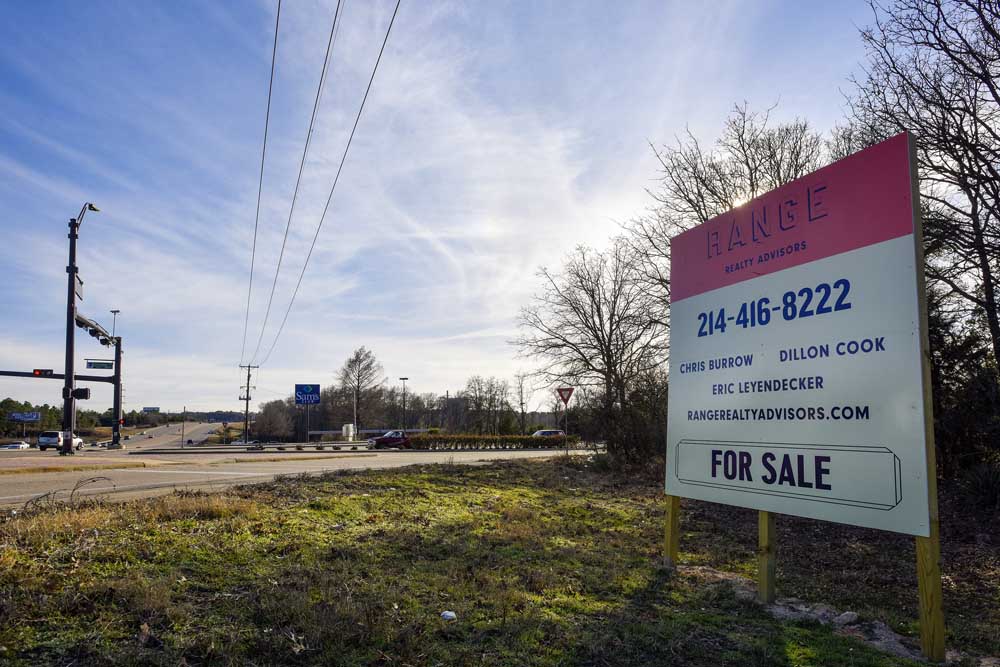Citing budget concerns, Tyler officials delay zoning decision on West Loop project
Published 7:30 pm Tuesday, March 6, 2018

- A parcel of land located by the intersection of Earl Campbell Parkway and Loop 323 in Tyler was listed for sale by Range Realty Advisors on Jan. 25, 2018.
Tyler officials delayed a decision on a proposal from a Chinese businessman to build a master-planned community after city staff issued a report saying that providing services for the development would create an almost $8 million budget deficit.
The Planning and Zoning Commission voted 5-2 on Tuesday to table, or delay, consideration of a zoning change application from Adams Engineering on behalf of the developer, who is seeking to develop the land near the west side of Loop 323, near Sam’s Club.
The developer, Xing Tan, is a Chinese businessman who envisions building an East-meets-West community on a 178-acre parcel of land that has been vacant for years. He plans to spend $1.6 billion over five years.
Tan would sell condominium-style homes to families in the American and Chinese markets. The zoning application requests a maximum of 6,000 homes on the property, but Tan’s representatives said Tuesday there can only feasibly be 5,000 housing units.
The commission made the decision to delay consideration at the recommendation of city staff, who issued a report saying the proposed community would require enough new city services create a $7.7 million deficit in the city’s budget over a five-year period.
The report said the project would increase population to the point that Tyler would need to hire dozens of new employees, including police officers, firefighters, street workers, library workers and animal control workers.
The report also projected the city would need to spend $50 million to upgrade capacity at the nearest water treatment plant and $6 million to replace two wastewater treatment pumps, among other improvements.
The report recommended tabling a decision on the zoning application for 30 days. During that time, the report said Adams Engineering should submit an analysis on the financial impacts of the plan and a description of how the project’s population would be phased-in.
The decision followed a tense, three-hour meeting in which city staff, members of the Planning Commission, representatives from Adams Engineering and community members discussed issues ranging from building heights and economic studies to immigration and segregation.
Heather Nick, the planning director for the city of Tyler, said the project would require “the highest-density zoning” that is available in the city, and the largest-scale development in the city’s history.
“We have to evaluate, does the city have the capacity to serve this development, and if not, then what are the additional costs?” Nick said. “And so like every zoning case that we do have even to the smallest … in every zoning case that we analyze we look at ‘is this a negative or a positive impact to city services and facilities?’ and that’s why it’s very important for us to receive that information.
“Based on what we have right now, we don’t have information showing us that it would have a positive impact or at least a neutral impact,” Nick said. “So we wanted to give the applicant more time to give us some information so that we could make a recommendation.”
Rick Martindale and Carter Delleney, who served as Tyler’s city engineer until December, were the two representatives from Adams Engineering who spoke at the meeting about the proposed project. They criticized the city’s findings.
“If this is something that’s going to become a precedent here — to require an economic impact analysis — that’s not really developer-friendly, to look at charging them, them spending tens of thousands of dollars for such a report to prove out their project,” Martindale said.
Martindale said the first phase of the development would bring about 500 units by August 2020, and then several hundred per year would be built in the following years. However, he said those estimates would be “really an aggressive schedule.”
Delleney said the city based its numbers on having 15,000 people living on the land, but Adams Engineering didn’t provide that number. He said the expenses described amount to a “wish list” of what departments would like to have.
Delleney said the city’s report is questioning the number of people who will be able to live in the city.
Ed Thompson, the developer of the Cascades, which is near the proposed development, spoke in favor of the project during the public comment period. He said the project is in line with plans the city has made to develop the northern and western portions of the city.
“I know change is different,” Thompson said. “When the Cascades first came up we went through the same thing, with a 16-story high-rise and condominiums.”
Thompson said Tan’s vision represents an “opportune time” to invest in the western portion of the city. He said if Tan has the resources to build the development, the city should allow it.
Beverly Beavers Brooks, a resident of the Cascades, spoke in support of the development. She put the proposal in the context of historical segregation in the western and northern parts of the city.
Brooks called Tyler a city that “won’t share growth” in predominantly minority areas, and said there are people in Tyler who won’t support development projects they don’t have complete control over.
“I am really concerned and believe that the citizens of Tyler are not that naïve, and I believe that we are above this,” Brooks said. “While I understand the importance of the city doing its due diligence, let’s not bury our heads in the sand.”
Beth Whitney, a member of the Planning Commission, said the developer was “moving a little too quickly,” and that the city needs more answers before approving the zoning change.
Whitney said Adams Engineering should let city officials work with them on “developing something that benefits everyone in Tyler, not just people that are not even from here.”
Before casting one of two dissenting votes, Broderick McGee said he would vote against tabling the decision because he supports the project. McGee said he did not want Tan to think that the community doesn’t want his investment.
Pamela Phoenix, another member of the Planning Commission, agreed. She said residents who live in the northern and western parts of the community are being left behind by Tyler’s recent development boom.
“This is a perfect opportunity” to change that, Phoenix said. “It’s still Tyler. We’re just evolving.”
Whitney said she’s not against the project. She said she just needs the developer to answer more questions.
Blair Swaim, another member of the Planning Commission, said tabling the decision was friendlier to the developer than rejecting the zoning change.
“Another 30 or 60 days is only a wise way to move forward for this community,” he said.
The zoning application can be considered again at the April meeting of the Planning and Zoning Commission.
TWITTER and INSTAGRAM: @_erinmansfield







